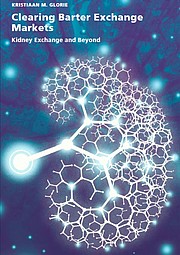Clearing Barter Exchange Markets: Kidney Exchange and Beyond Defended on Thursday, 27 November 2014
Advanced computer assisted markets, otherwise known as smart markets, are becoming an important part of our modern society. This dissertation considers smart barter exchange markets, which enable people to trade a wide range of goods: from shifts, to houses, to kidneys. Centralized and computerized clearing is what makes these markets ‘smart’. The market clearing problem is to match demand and supply so as to maximize the gains of trade. Trades, in this regard, need not be limited to pairwise swaps but may consist of trading cycles and chains involving multiple agents.
This dissertation presents several sophisticated market clearing algorithms that enable optimal clearing in large real-life barter exchange markets. With a particular focus on kidney exchanges, it shows how these algorithms can enable a significant alleviation of the present shortage of kidney donors and an improvement in health outcomes for kidney patients. State-of-the-art techniques are developed to allow the algorithms to be scalable, even when there are bounds on the number of simultaneous transactions, multiple objective criteria, and side constraints. Furthermore, innovative models and solution approaches are presented to allow market uncertainty, such as transaction failure, to be taken into account.
The research presented in this dissertation contributes to the advancement of scientific knowledge in combinatorial optimization and market design, particularly in the domains of mathematical programming and market clearing, and aids the establishment and operation of smart barter exchange markets in the field of kidney exchange and beyond.
Keywords
Market clearing, Barter exchange, Kidney exchange, Combinatorial optimization, Market design, Mathematical programming, Robust optimization, Column generation, Branch-and-price, Simulation, Health Care, Transplantation









